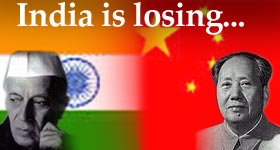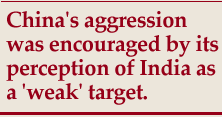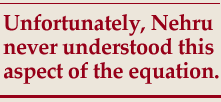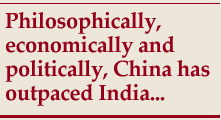The Rediff Special/Dr Michael E Marti

 "We are getting out of touch with realities in a modern world; we are living in our own creation and we have been shaken out of it."
"We are getting out of touch with realities in a modern world; we are living in our own creation and we have been shaken out of it."
These words spoken by Nehru in 1962 expressed his shock and disbelief at the Chinese invasion of India's northeastern border. Yet, on the 40th anniversary of the border clash, these words seem more prophetic than descriptive.
India is still smarting from the humiliation of its defeat. After more than a generation, public opinion, fanned by its leadership, still feels a need to reclaim its honour, its lost territory. For India, the issue has not been resolved as a matter of fact or policy.
But what India failed to recognize at the time and has yet to come to terms with is that 1962 was more than a territorial dispute; it signalled the beginning of a war for dominance in Asia.
Like many of the colonial states that gained their independence in the 20th century, China did not accept the "artificial" boundaries imposed by the Western imperialists, which in the case of India was the British Raj. With independence in 1949, China initiated territorial negotiations with all of its neighbours, and in south Asia this included Pakistan, Nepal, Burma, and India. Its purpose was not only to establish defensible orders, but to reclaim the "lost territories" of the empire.
India had not taken China seriously. Nehru could not believe that one fellow Socialist would attack another; and in any event, he felt secure behind the impregnable wall of ice that is the Himalayas.
Both proved to be tragic miscalculations of China's determination and military capabilities. Nehru tried to engage China in a prolonged strategy of diplomatic foot-dragging, while on the ground Indian troops moved to outflank Chinese positions.
Frustrated by India's duplicity, China took direct action.
 China's aggression was encouraged by its perception of India as a "weak" target. After all, Nehru had taken no action in 1951 when China invaded and occupied Tibet, eliminating the traditional buffer between the two; and, except to grant asylum to the Dalai Lama, he, again, did nothing in 1959, when China ruthlessly put down the uprising in Tibet.
China's aggression was encouraged by its perception of India as a "weak" target. After all, Nehru had taken no action in 1951 when China invaded and occupied Tibet, eliminating the traditional buffer between the two; and, except to grant asylum to the Dalai Lama, he, again, did nothing in 1959, when China ruthlessly put down the uprising in Tibet.
Then there was Nehru's doctrine of Panchshila (Five Principles of Peaceful Coexistence). The basis of the 1954 Sino-Indian treaty over Tibet, it was taken by the Chinese as a statement of Indian pacifism.
As conceived by Nehru, Panchshila was based upon mutual respect among nations, peaceful coexistence, and non-interference in the internal affairs of others. He had offered it to the Afro-Asian Solidarity Movement and Non-Aligned Movement at the Bandung Conference in 1955 as the guiding philosophy for an emerging Third World power bloc, an alternative to Moscow and Washington.
It was also at this conference that Nehru introduced the newly independent Chinese leaders to the world. He assumed that as former colonies they shared a sense of solidarity, as expressed in the phrase 'Hindi-Chini bhai bhai' (Indians and Chinese are brothers).
But much to China's chagrin, Nehru and India, as heir apparent to the British Empire in Asia, assumed the mantle of leadership of the movement. Mao was infuriated. His sense of cultural superiority and unquestioned revolutionary credentials dictated that China was the rightful leader.
This made the subsequent border issue more than territorial; it was an opportunity to assert China's pre-eminence as an Asian power and to humiliate India.
Unfortunately, Nehru never understood this aspect of the equation. He was dedicated to the ideals of brotherhood and solidarity among Third World nations, while China was dedicated to a vision of itself as the hegemon of Asia.
In the intervening years, China has taken every opportunity to contain India. It supports Pakistan economically and militarily. Not only has India fought three wars with Pakistan since Partition, it also maintains one million men in arms on the border. All of which drains India's resources, politically and economically.
 China has also encroached on India's traditional spheres of influence in Nepal, Bhutan, and Burma, by establishing trade and military relations; and China has increased its presence in the Indian Ocean with bases in Burma and Pakistan, challenging India in its own backyard.
China has also encroached on India's traditional spheres of influence in Nepal, Bhutan, and Burma, by establishing trade and military relations; and China has increased its presence in the Indian Ocean with bases in Burma and Pakistan, challenging India in its own backyard.
Philosophically, economically, and politically, China has outpaced India because it has remained true to its goal of becoming a rich and powerful nation. It has been willing to sacrifice ideology and put aside or find a temporary fix to any problem that could interfere with that goal.
China has scrapped communist ideology and socialist economics in favour of nationalism and capitalism. It has put the issues of Taiwan and the South China Sea islands on the back burner, despite its hardline rhetoric. And it has been opportunistic about its alliances, siding with either Moscow or Washington as necessity dictated. All of which has been done in the name of economic development.
Ironically, China has even co-opted Nehru's Panchshila and resurrected the spirit of Bandung as the basis for its new world order in Asia.
The Five Principles, however, are now based on multi-lateralism, mutual co-operation, economic development, and security. This time the goal is to replace the bilateral alliances of the Cold War era with multilateral arrangements based on economic and security co-operation.
China is creating a new power bloc with itself as the head and India as the odd man out. India, on the other hand, has been "living in its own creation", a state defined by internal turmoil, external threats, and a stagnating economy. It has been unable or unwilling to make the hard choices that have characterized China's ascendancy.
 It cannot find a way to either put off or come to terms with Pakistan. It has been unable to make a significant shift away from its socialist economy, despite various attempts since 1991. And even in the case of its border dispute with China, which has offered to exchange territory to settle the issue, India remains frozen in time, unable to accept anything that does not redeem its honour.
It cannot find a way to either put off or come to terms with Pakistan. It has been unable to make a significant shift away from its socialist economy, despite various attempts since 1991. And even in the case of its border dispute with China, which has offered to exchange territory to settle the issue, India remains frozen in time, unable to accept anything that does not redeem its honour.
Of course, as a democracy, India must answer to the will of the people. But responsible leadership shapes, moulds, and educates public opinion to forge a consensus on national priorities. It does not pander to nationalist or communal emotionalism for its own benefit.
The border war of 1962 was more than a loss of territory for India. It marked the beginning of an undeclared war for pre-eminence in Asia; and India is losing. Asia, and the West, needs a strong and democratic India to be the alternative to an authoritarian, expansionist China. But to fulfil that role, India must "get in touch with the realities in a modern world and shake itself out of the world of its own creation".
(Dr Marti, author of China and the Legacy of Deng Xiaoping (Brassey's, Washington, DC, 2002), is a historian specializing in Chinese national security and foreign policy. He was a senior fellow at the Centre for the Study of Chinese Military Affairs, Institute for National Strategic Studies, National Defence University, and an assistant country director for China, Taiwan, and Mongolia in the Office of the Assistant Secretary of Defence for International Security Affairs/Asian and Pacific. Dr Marti has a PhD in Chinese history from George Washington University and is a graduate of the National War College. The views expressed in this paper are those of the author and do not represent the views of the Department of Defence or the United States Government.)
